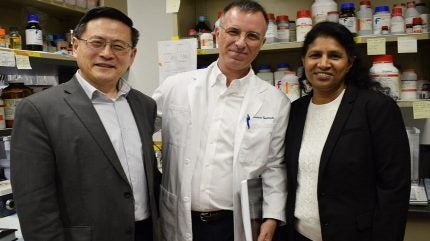
Northwell Health’s Feinstein Institutes for Medical Research has received a five-year, $2.9m grant from the National Institutes of Health (NIH) to explore the use of human ghrelin as a countermeasure against radiation-induced gastrointestinal syndrome (GI-ARS).
Led by Dr Ping Wang, chief scientific officer and senior vice-president, alongside Max Brenner and Asha Jacob Varghese, both associate professors at the Feinstein Institutes, the research will delve into the protective properties of the ghrelin, commonly known as the “hunger hormone”, in shielding the intestines from radiation damage.

Discover B2B Marketing That Performs
Combine business intelligence and editorial excellence to reach engaged professionals across 36 leading media platforms.
Dr Wang said: “We are incredibly grateful to the NIH for this funding, which will allow us to explore the potential of ghrelin as a life-saving treatment for GI-ARS.
“Human ghrelin has a positive safety record so far and is easy to produce, making it a strong contender for widespread use in emergencies. We’re hopeful this research will eventually result in a real solution for protecting people from radiation exposure.”
Studies carried out by the team have shown that the hormone’s administration may decrease intestinal damage and enhance survival rates following radiation exposure.
The new research aims to understand how ghrelin, which primarily influences the brain, can aid the recovery of intestinal stem cells through the vagus nerve.

US Tariffs are shifting - will you react or anticipate?
Don’t let policy changes catch you off guard. Stay proactive with real-time data and expert analysis.
By GlobalDataThe Feinstein Institutes’ team, including Kevin Tracey, president and CEO and Karches Family Distinguished Chair in Medical Research, is working collaboratively on this project.
Produced mainly by the stomach and also by the small intestine, brain and pancreas, ghrelin not only claims to stimulate appetite but also affects gastric motility and acid secretion, and has broader implications for sleep and mood.
Up to now, treatments for GI-ARS have been approved by the Food and Drug Administration (FDA). In February 2023, researchers at the institute identified a new protein that could be targeted for treating lethal sepsis.




